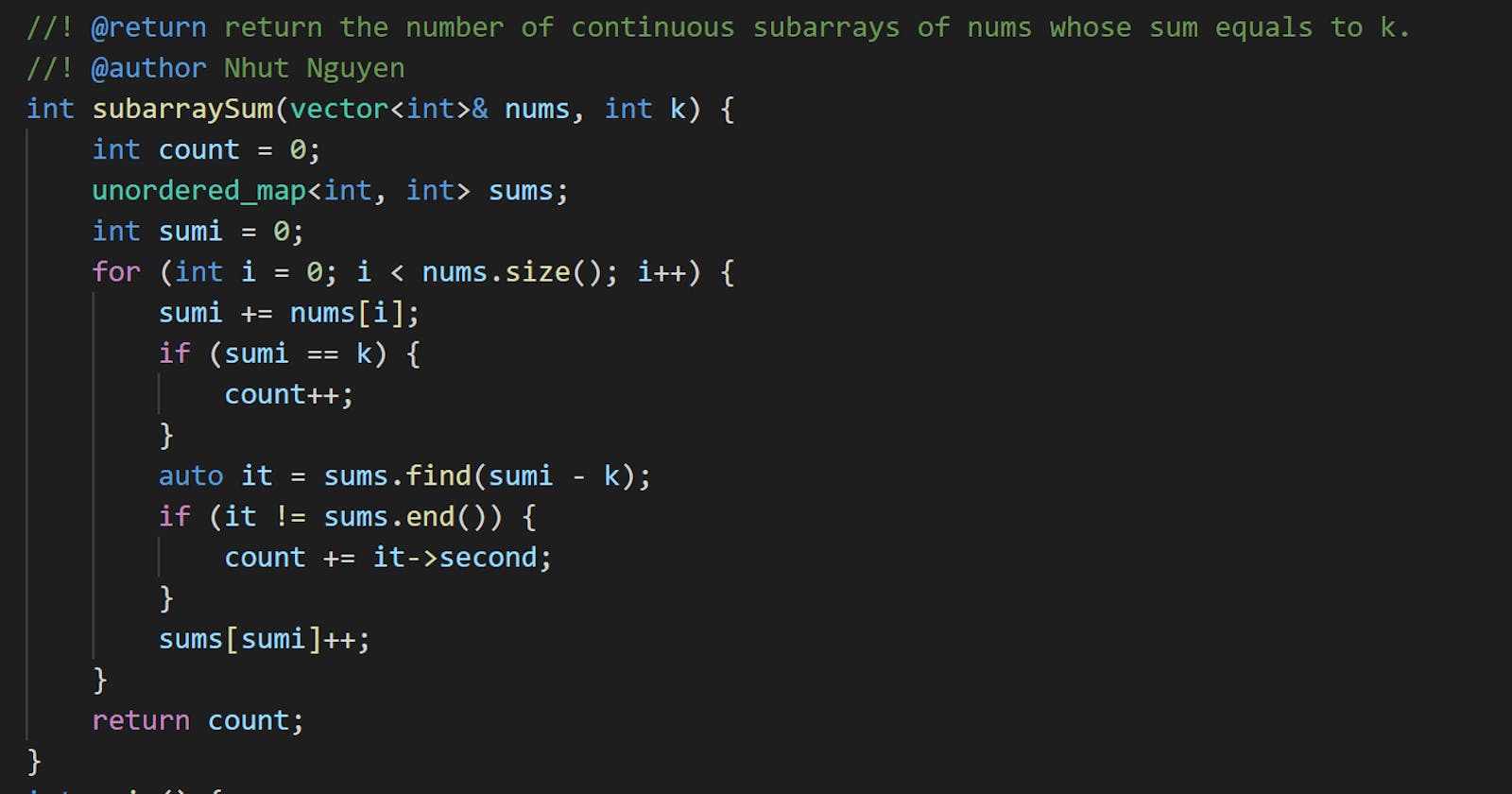Problem Statement
Given an array of integers nums and an integer k, return the total number of continuous subarrays whose sum equals to k.
Example 1
Input: nums = [1,1,1], k = 2
Output: 2
Example 2
Input: nums = [1,2,3], k = 3
Output: 2
Constraints
1 <= nums.length <= 2 * 10^4.-1000 <= nums[i] <= 1000.-10^7 <= k <= 10^7.
Solution 1: Bruteforce
For each element, for all subarrays starting from it, choose the satisfied ones.
Example 3
For nums = [1, -1, 0] and k = 0, you get 3 subarrays for the result:
Three subarrays start from
1, which are[1],[1, -1], and[1, -1, 0]. Only the last two are satisfied.Two subarrays start from
-1, which are[-1]and[-1, 0]. None is satisfied.Only
[0]is the subarray starting from0. It is satisfied.
Code
#include <iostream>
#include <vector>
using namespace std;
int subarraySum(vector<int>& nums, int k) {
int count = 0;
for (int i = 0; i < nums.size(); i++) {
int sum = 0;
for (int j = i; j < nums.size(); j++) {
sum += nums[j];
if (sum == k) {
count++;
}
}
}
return count;
}
int main() {
vector<int> nums{1,1,1};
cout << subarraySum(nums, 2) << endl;
nums = {1,2,3};
cout << subarraySum(nums, 3) << endl;
nums = {1,-1,0};
cout << subarraySum(nums, 0) << endl;
}
Output:
2
2
3
Complexity
Runtime:
O(N^2), whereN = nums.length.Extra space:
O(1).
Solution 2: Prefix sum
In the solution above, many sums can be deducted from the previous ones.
Example 4
For nums = [1, 2, 3, 4]. Assume the sum of the subarrays [1], [1, 2], [1, 2, 3], [1, 2, 3, 4] were computed in the first loop. Then the sum of any other subarray can be deducted from those values.
sum([2, 3]) = sum([1, 2, 3]) - sum([1]).sum([2, 3, 4]) = sum([1, 2, 3, 4]) - sum([1]).sum([3, 4]) = sum(1, 2, 3, 4) - sum(1, 2).
In general, assume you have computed the sum sum[i] for the subarray [nums[0], nums[1], ..., nums[i]] for all 0 <= i < nums.length. Then the sum of the subarray [nums[j], nums[j+1], ..., nums[i]] for any 0 <=j <= i can be computed as sum[i] - sum[j].
Code
#include <iostream>
#include <vector>
using namespace std;
int subarraySum(vector<int>& nums, int k) {
vector<int> sum(nums.size());
sum[0] = nums[0];
for (int i = 1; i < nums.size(); i++) {
sum[i] = sum[i-1] + nums[i];
}
int count = 0;
for (int i = 0; i < nums.size(); i++) {
if (sum[i] == k) {
count++;
}
for (int j = 0; j < i; j++) {
if (sum[i] - sum[j] == k) {
count++;
}
}
}
return count;
}
int main() {
vector<int> nums{1,1,1};
cout << subarraySum(nums, 2) << endl;
nums = {1,2,3};
cout << subarraySum(nums, 3) << endl;
nums = {1,-1,0};
cout << subarraySum(nums, 0) << endl;
}
Output:
2
2
3
Complexity
Runtime:
O(N^2), whereN = nums.length.Extra space:
O(N).
Solution 3: Faster lookup
You can rewrite the condition sum[i] - sum[j] == k in the inner loop of Solution 2 to sum[i] - k == sum[j].
Then that loop can rephrase to "checking if sum[i] - k was already a value of some computed sum[j]".
Now you can use an unordered_map to store the sums as indices for the fast lookup.
Code
#include <iostream>
#include <vector>
#include <unordered_map>
using namespace std;
int subarraySum(vector<int>& nums, int k) {
int count = 0;
unordered_map<int, int> sums;
int sumi = 0;
for (int i = 0; i < nums.size(); i++) {
sumi += nums[i];
if (sumi == k) {
count++;
}
auto it = sums.find(sumi - k);
if (it != sums.end()) {
count += it->second;
}
sums[sumi]++;
}
return count;
}
int main() {
vector<int> nums{1,1,1};
cout << subarraySum(nums, 2) << endl;
nums = {1,2,3};
cout << subarraySum(nums, 3) << endl;
nums = {1,-1,0};
cout << subarraySum(nums, 0) << endl;
}
Output:
2
2
3
Complexity
Runtime:
O(N), whereN = nums.length.Extra space:
O(N).
References
Thanks for reading. Feel free to share your thought about my content and check out my FREE book “10 Classic Coding Challenges”.

